The thought of sharing your home with a furry friend is often delightful, but for many, the reality of constant pet hair can be a significant deterrent. If you’ve been dreaming of a canine companion but dread the endless lint rolling, vacuuming, and sneezing, you’re not alone. The good news is that there are many charming, petite breeds that boast minimal to no shedding, making them ideal for allergy sufferers, those who prefer a tidy home, or individuals living in smaller spaces like apartments. These small types of dogs that don’t shed offer all the love and companionship without the overwhelming upkeep of a heavy-shedding coat. Delving into the world of these unique breeds opens up a wealth of options for finding a furry family member that perfectly fits your lifestyle and preferences, ensuring a harmonious and hair-free living environment.
Understanding “Non-Shedding” vs. “Low-Shedding”
It’s important to clarify what “non-shedding” truly means in the canine world. While no dog is entirely 100% shed-free – they all lose some hair, just like humans – certain breeds have coats that shed significantly less than others. These dogs often have hair that grows continuously, similar to human hair, rather than fur that goes through seasonal shedding cycles. This characteristic means that instead of shedding dead hair onto your furniture, it typically gets caught in their growing coat. Consequently, these breeds are often referred to as “hypoallergenic,” as they tend to produce less dander (tiny flakes of skin often attached to pet hair), which is the primary allergen for many people. However, this also implies a different set of grooming responsibilities, as their continuously growing coats require regular brushing and professional trimming to prevent mats and tangles. Choosing a small breed dog that doesn’t shed is a commitment to regular grooming, but it’s a worthwhile trade-off for a cleaner home and fewer allergy symptoms.
Top Small Dog Breeds That Don’t Shed or Shed Minimally
For those seeking a pint-sized companion that won’t leave a trail of hair, these breeds are among the most popular and suitable choices. Each offers a unique blend of personality and low-shedding qualities. These breeds are often considered perfect small house dogs that don’t shed, adapting well to indoor living.
Affenpinscher
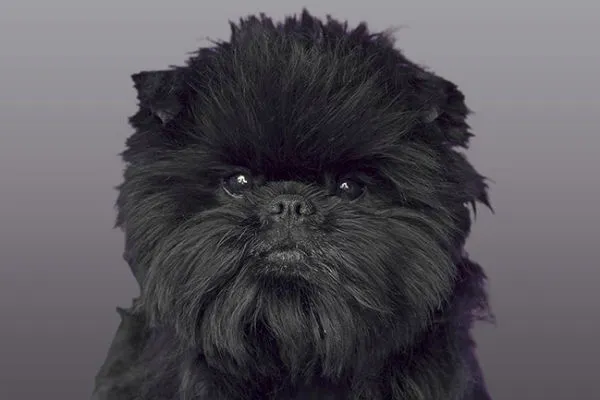 Affenpinscher sitting calmly indoors
Affenpinscher sitting calmly indoors
The Affenpinscher, whose name translates to “monkey-like terrier,” truly lives up to its moniker with its intelligent gaze and impish appearance. Despite their small stature, these Toy Group members are remarkably fearless and possess a keen sense of awareness, making them excellent little watchdogs without being overly yappy. Their wiry coat is a dream for those seeking a low-maintenance pet, as it sheds very minimally and is notably free of a strong “doggy” odor. A simple twice-weekly brushing with a slicker brush and comb is typically all that’s required to keep their shaggy yet neat look intact. Known for their humorous antics and charming personality, Affenpinschers are a delightful addition to any home.
Basenji
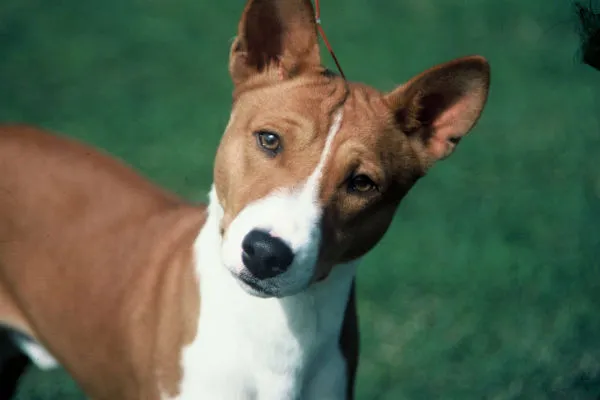 Basenji dog with alert expression
Basenji dog with alert expression
Often called the “barkless dog” due to their unique yodel-like vocalizations, the Basenji is an excellent option for those who admire hounds but prefer to avoid their characteristic scent and shedding habits. This breed is renowned for its very minimal shedding and short, fine coat, which requires little more than occasional brushing to keep it in prime condition. Basenjis are naturally clean and often groom themselves like cats. Their quiet nature makes them particularly well-suited for apartment living, provided they receive ample daily exercise and mental stimulation. Active and intelligent, Basenjis thrive with owners who can provide consistent training and engagement.
Bichon Frise
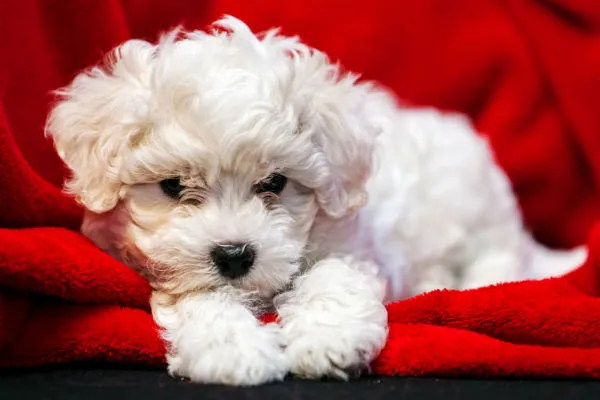 Fluffy white Bichon Frise smiling
Fluffy white Bichon Frise smiling
The Bichon Frise is the quintessential small non-shedding dog breed, cherished for its cheerful disposition and fluffy, powder-puff appearance. These affectionate and playful dogs are an ideal choice for individuals with allergies, thanks to their truly non-shedding coat. However, “non-shedding” does not equate to “maintenance-free.” The Bichon Frise’s hair grows continuously, demanding frequent grooming, daily brushing to prevent mats, and regular baths to maintain their iconic pristine white coat. Their lively spirit and devotion to their families make the grooming effort a small price to pay for such a lovable companion.
Bolognese
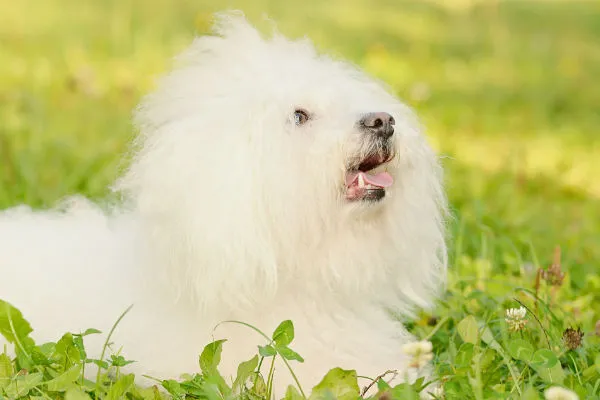 White Bolognese dog with long, fluffy coat
White Bolognese dog with long, fluffy coat
Sharing a common ancestry with the Bichon Frise, the Bolognese also boasts a distinctive fluffy coat composed of hair rather than fur. This breed is a true non-shedder, making it another excellent choice for allergy sufferers. While they don’t shed, their beautiful cotton-like coat requires consistent care. Daily brushing is essential to remove dead hair and prevent matting, ensuring these charming lap dogs always look their best. Bolognese dogs are known for their calm, affectionate, and intelligent nature, forming strong bonds with their families and thriving on companionship. They are content with moderate indoor exercise and make excellent cuddle buddies.
Brussels Griffon
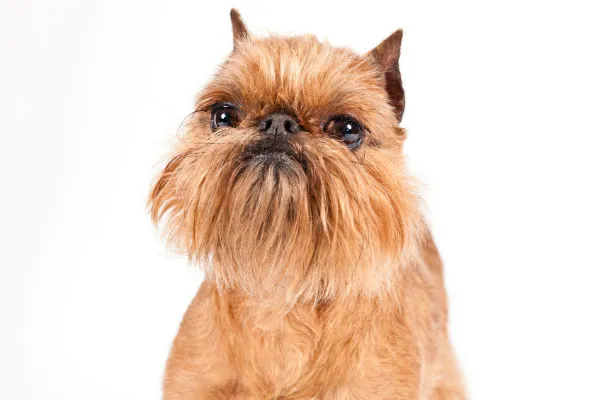 Brussels Griffon with a quizzical expression
Brussels Griffon with a quizzical expression
Despite their diminutive size, Brussels Griffons are robust little dogs that don’t demand excessive pampering. This breed comes in both smooth-coated and rough-coated varieties, both of which are minimal shedders, making them a great option for those who prefer less hair around the house. Regular grooming is beneficial for both coat types to keep them healthy. Their small stature means that their exercise needs are easily met with daily walks and indoor play, fitting perfectly into various living situations. Loyal and affectionate, the Brussels Griffon forms deep bonds with its family and thrives in homes where they receive plenty of attention and companionship.
Chinese Crested
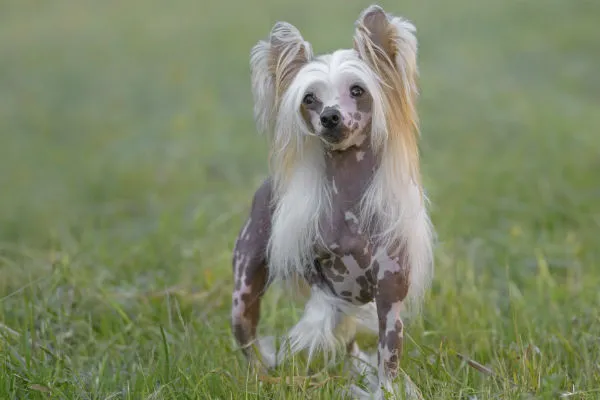 Hairless Chinese Crested dog showing unique features
Hairless Chinese Crested dog showing unique features
For those looking to completely minimize shedding, the Chinese Crested offers a unique solution as a hairless breed. This fascinating breed actually comes in two distinct coat types: the Hairless and the Powderpuff. The Hairless variety typically has hair only on their head (crest), tail, and feet, presenting a truly low-shedding option. The Powderpuff, conversely, is covered in a soft, fine double coat of hair that sheds very minimally. Hairless dogs require special attention to their skin, needing protection from sunburn and cold, and are prone to skin irritations. Both varieties are affectionate, playful, and thrive on human companionship, making them charming and unconventional choices for those who appreciate their unique appearance and minimal shedding.
Coton de Tulear
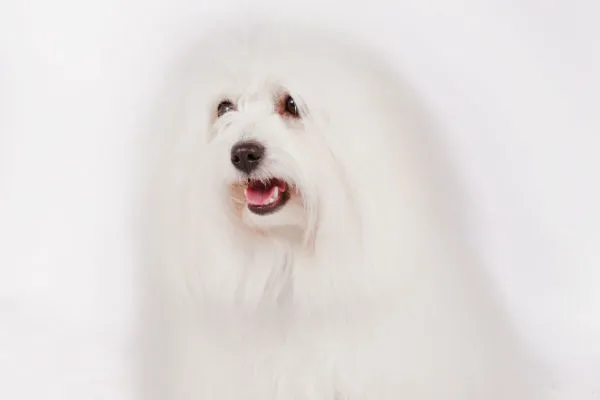 White Coton de Tulear looking gentle
White Coton de Tulear looking gentle
The Coton de Tulear, often referred to as the “Royal Dog of Madagascar,” is celebrated for its distinctive, long, fluffy coat that feels as soft as cotton. This beautiful coat is considered hypoallergenic, making the Coton an excellent choice for allergy sufferers and those seeking a small type of dog that doesn’t shed. While their coat is low-shedding, it does require diligent daily grooming to prevent matting and maintain its pristine condition. Despite the grooming commitment, the Coton de Tulear’s lighthearted, gentle, and intelligent nature, coupled with their unwavering devotion, makes them incredibly rewarding companions. They are playful yet adaptable, fitting well into various family dynamics.
Havanese
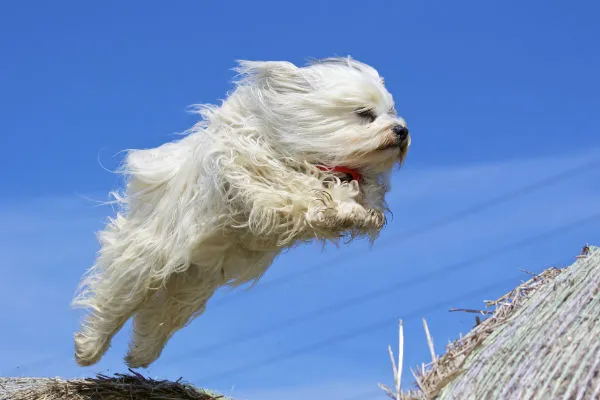 Havanese dog with long, silky coat indoors
Havanese dog with long, silky coat indoors
Originating from Cuba, the Havanese charms owners with its spirited personality and a luxurious coat that is known for its non-shedding qualities. This means less time spent cleaning up dog hair and more quality time romping around with these playful and intelligent companions. Their silky coat, however, does require consistent care to keep it healthy and tangle-free. Weekly brushing, along with regular baths, is essential to prevent mats and maintain their beautiful appearance. Havanese are highly adaptable, eager to please, and thrive on being the center of attention, making them wonderful family pets and excellent small house dogs that don’t shed.
Maltese
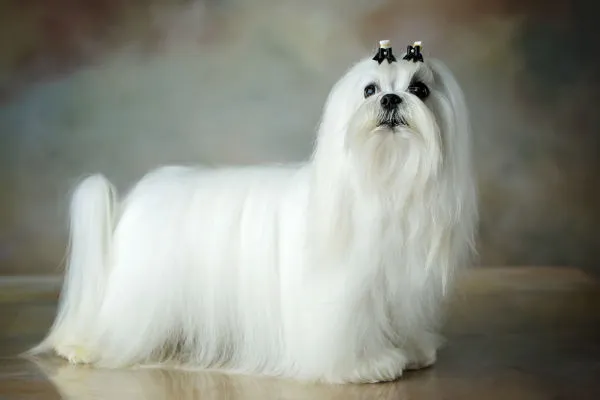 Maltese dog with flowing white hair
Maltese dog with flowing white hair
The Maltese has captivated human hearts for over three millennia, an ancient breed originating from the island of Malta. This regal companion has changed little over centuries, partly due to their exquisite, long, white coat that sheds very little, making them a perfect lap dog for those sensitive to dog hair. Their beautiful, silky hair requires regular brushing to prevent mats from forming and occasional baths to keep it clean and gleaming. Beyond their stunning looks, Maltese dogs are known for their gentle, playful, and affectionate demeanor, making them wonderful companions that thrive on close human interaction and indoor living.
Lhasa Apso
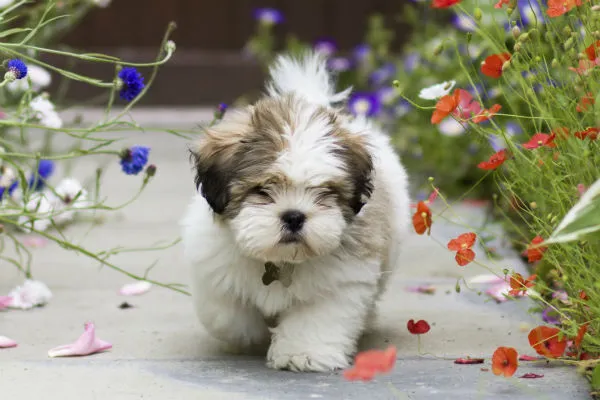 Lhasa Apso with long hair covering its face
Lhasa Apso with long hair covering its face
Hailing from the high altitudes of Tibet, the Lhasa Apso was originally bred as watchdogs for monasteries and palaces. This small yet sturdy breed makes an excellent companion, embodying a unique blend of calm wisdom and playful energy. Lhasa Apsos are renowned for their non-shedding coats, which are long and dense, designed to protect them from harsh climates. While they don’t shed, their magnificent coats require significant maintenance. Many owners opt for a “puppy cut” to simplify daily grooming and brushing. Intelligent and independent, Lhasa Apsos are loyal and protective of their families, enjoying brisk walks as much as quiet time on their owner’s lap.
Miniature Schnauzer
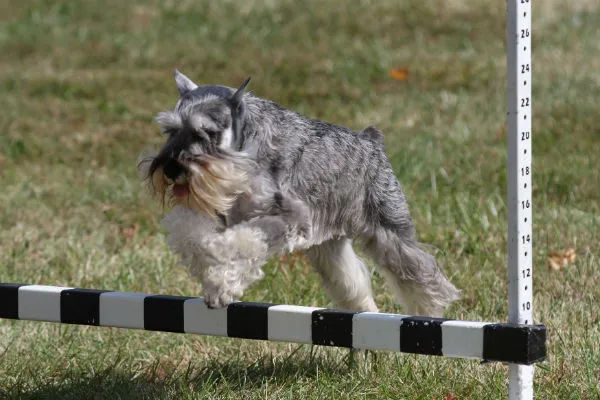 Miniature Schnauzer with its characteristic beard and eyebrows
Miniature Schnauzer with its characteristic beard and eyebrows
The Miniature Schnauzer is a smart, spirited, and highly trainable little dog that exudes cheerfulness. Strongly resembling its larger Standard Schnauzer cousin, this Terrier breed is characterized by its distinctive wiry coat, which sheds very little. Their adaptable nature makes them equally at home in bustling cities or tranquil countryside settings, as long as they are close to their human companions. To keep Miniature Schnauzers looking their best, a routine of weekly brushing and professional grooming every few weeks is recommended. With their robust health and engaging personalities, Miniature Schnauzers are consistently among the top choices for small types of dogs that don’t shed.
Poodle
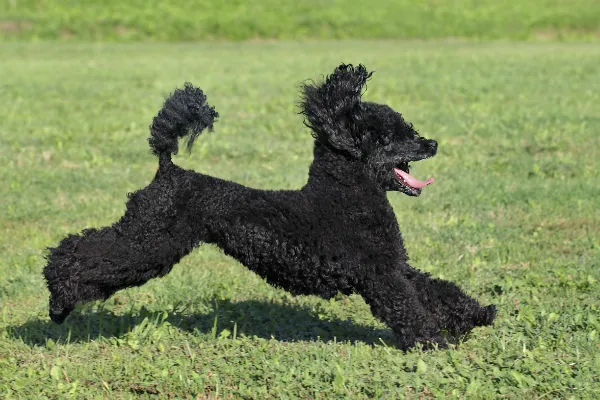 White Poodle in a show clip
White Poodle in a show clip
When people think of small dogs that don’t shed, Poodles are often the first breed that comes to mind, and for good reason. Poodles, particularly the Miniature and Toy varieties, are non-shedding and widely considered hypoallergenic, offering these desirable qualities in intelligent and elegant packages. These smaller Poodles differ only in size from their Standard counterparts, retaining the breed’s signature intelligence, making them exceptionally easy to train. They are an active, proud, and highly social breed whose curly, dense coat requires regular professional grooming and daily brushing to prevent matting and maintain their distinguished appearance.
Scottish Terrier
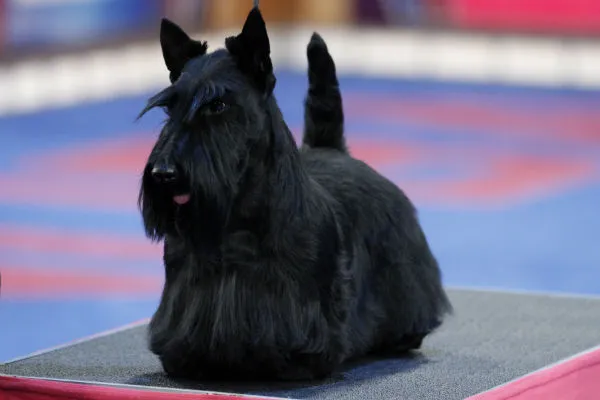 Scottish Terrier standing alertly
Scottish Terrier standing alertly
The Scottish Terrier, affectionately known as a “Scottie,” is a Terrier breed revered for its boldness, confidence, and surprisingly large personality packed into a small frame. Their wiry, weather-resistant double coat sheds very little, making them a practical choice for those looking for minimal hair around the home. However, to maintain the health of their unique coats and preserve the breed’s iconic outline, Scotties require regular brushing, professional grooming, and occasional hand-stripping. Intelligent and independent, Scotties possess a strong prey drive, which means careful supervision is needed around smaller pets. They are loyal and form strong bonds with their families, thriving on consistent training and clear boundaries.
Shih Tzu
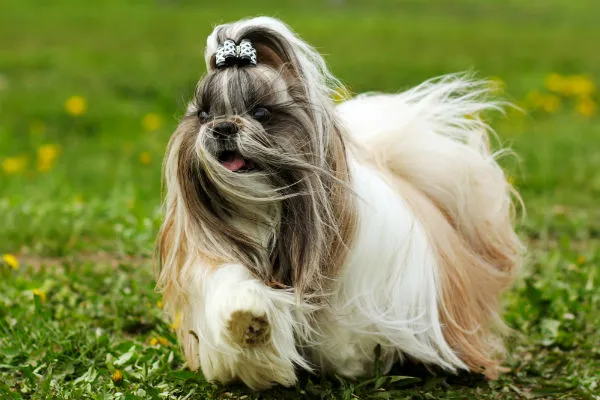 Shih Tzu with long, flowing hair
Shih Tzu with long, flowing hair
The Shih Tzu, with its long and illustrious pedigree, was once the favored house pet of the Tang Dynasty in China. These “little lion dogs” come in a vibrant array of colors and patterns, captivating all who meet them. Their long, silky hair is very low-shedding, making them excellent candidates for homes seeking small types of dogs that don’t shed. When brushed out, their coat looks exceptionally regal, befitting their royal ancestry. Despite their luxurious appearance, Shih Tzus are sturdy and lively, often described as having an arrogant carriage due to their proudly held heads and curling tails. Bred solely as companions, their gentle, trusting nature makes them exceptional and affectionate family members, content with indoor play and cuddling.
West Highland White Terrier
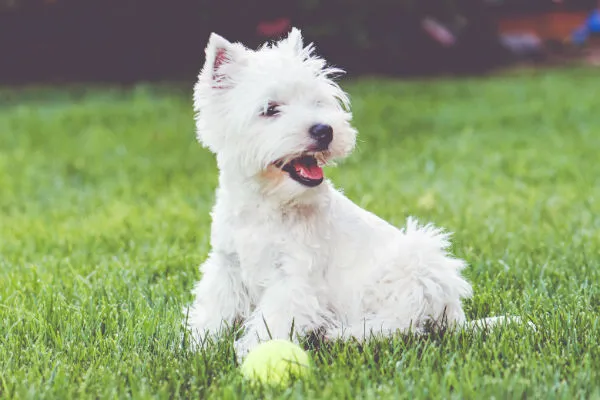 West Highland White Terrier looking curious
West Highland White Terrier looking curious
The West Highland White Terrier, affectionately called a “Westie” by its enthusiasts, possesses a coarse, white double coat that sheds very little. This sturdy and charming little dog is intelligent, loyal, happy, and highly entertaining. Westies are curious and possess moderate energy levels, thriving on daily walks and engaging play. Like many Terriers, they have an independent streak that can sometimes make training a delightful challenge, but their keen intelligence means they respond well to consistent, positive reinforcement. Westies are robust companions that adapt well to various living environments and are a popular choice for families.
Xoloitzcuintli
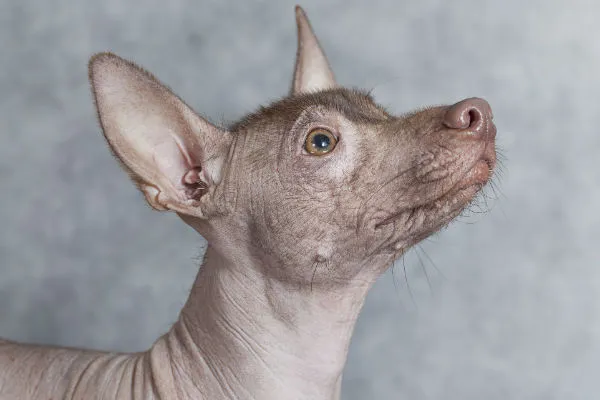 Hairless Xoloitzcuintli with distinct features
Hairless Xoloitzcuintli with distinct features
Also known as the Mexican Hairless Dog, the Xoloitzcuintli (pronounced Sho-lo-eets-kweent-lee) is an ancient and rare breed that can be either hairless or coated. The Hairless variety typically retains a small amount of hair on their heads, while the coated variety sports a very short, fine coat that sheds minimally. As with all hairless breeds, Xolos require extra attention to their skin, needing protection from the elements, such as sunscreen in summer and warm clothing in winter. Xolos are known for being attentive watchdogs and affectionate companions. While they enjoy physical activities, they are equally content with a tranquil presence around the home, making them unique small to medium dog breeds that don’t shed.
Yorkshire Terrier
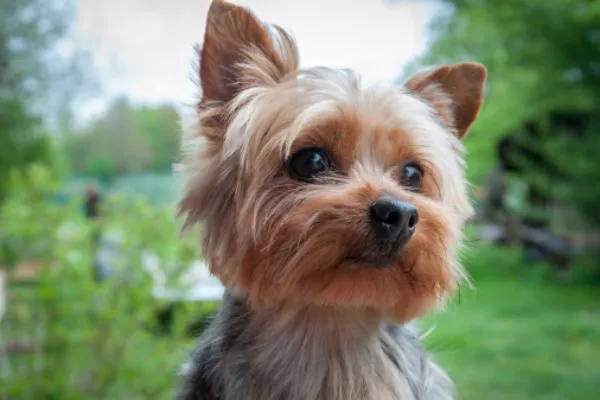 Yorkshire Terrier with silky topknot
Yorkshire Terrier with silky topknot
Sprightly, tenacious, and incredibly affectionate, the Yorkshire Terrier, or “Yorkie,” is a Toy breed brimming with personality. These spunky lap dogs have secured their place as one of America’s most popular breeds, and for good reason. Yorkshire Terriers do not shed, and their long, silky coats are beautiful when brushed daily, a task made easy by their small size. Despite their regal carriage, Yorkies have working-class roots, originally hunting rats in English clothing mills. Today, they are just as happy to snuggle on a lap as they are to engage in playful mischief, offering endless entertainment and devotion.
Beyond the List: Other Low-Shedding Terriers
The Terrier group, in general, is a treasure trove of small medium dog breeds that don’t shed or shed minimally. Their characteristic wiry and coarse coats are inherently designed to be weather-resistant and shed less than many other coat types. Breeds like the Border Terrier, Cairn Terrier, and Lakeland Terrier also fall into this category, offering similar low-shedding benefits. These breeds often share the feisty, intelligent, and independent spirit common among Terriers, making them lively and engaging companions for active families.
Essential Grooming for Non-Shedding Small Dogs
While these dogs offer the undeniable benefit of reduced shedding, it’s crucial to understand that “non-shedding” does not mean “no maintenance.” In fact, these breeds often require more diligent grooming than their shedding counterparts. Their continuously growing hair needs regular attention to prevent matting, skin issues, and discomfort.
- Daily Brushing: Most non-shedding breeds benefit from daily brushing. This helps remove loose hair that gets caught in the coat, prevents tangles, and distributes natural skin oils, keeping their skin and coat healthy.
- Regular Baths: Depending on the breed and activity level, baths every 2-4 weeks are often necessary to keep their coats clean and free of dirt and allergens. Use dog-specific shampoos and conditioners.
- Professional Grooming: Many of these breeds, particularly those with continuously growing coats like the Bichon Frise or Poodle, require professional grooming every 4-8 weeks. This includes trimming, styling, and thorough cleaning, which are vital for their health and appearance.
- Ear and Nail Care: Don’t forget regular ear cleaning to prevent infections, especially for breeds with floppy ears, and nail trims to prevent discomfort and foot problems.
Important Considerations Before Adopting Your Furry Friend
Choosing a dog is a significant decision. While a low-shedding coat is a huge plus, remember to consider the breed’s overall temperament, energy level, and specific care requirements to ensure a good match for your household.
- Time Commitment: Even if they don’t shed much, these dogs still need your time for grooming, exercise, training, and companionship.
- Temperament Matching: Research each breed’s personality to find one that aligns with your family’s lifestyle. Are you looking for a calm lap dog or a playful, energetic companion?
- Health and Vet Care: Regardless of shedding, all dogs require regular veterinary check-ups, vaccinations, and a high-quality diet to prevent health problems.
- Reputable Breeders: Always acquire a puppy from a reputable breeder who prioritizes the health and well-being of their dogs. Avoid puppy mills or unethical sources.
Finding Your Fur-Ever Friend
Selecting one of the many wonderful small types of dogs that don’t shed can significantly enhance your life, providing companionship without the constant battle against pet hair. From the playful Bichon Frise to the intelligent Poodle, there’s a low-shedding small breed out there for almost every preference and lifestyle. Remember that while these breeds minimize hair around your home, they do require dedicated grooming to keep their unique coats healthy and beautiful. Thorough research into each breed’s specific needs and temperament will ensure you find the perfect low-shedding companion to welcome into your family. Explore more about specific small breed dog that doesn’t shed to make an informed decision and enjoy a lifetime of joyful companionship.
